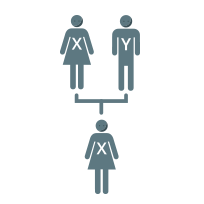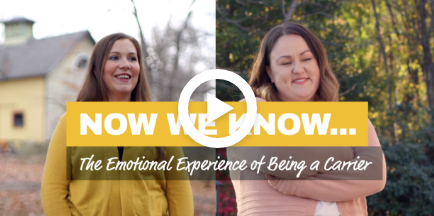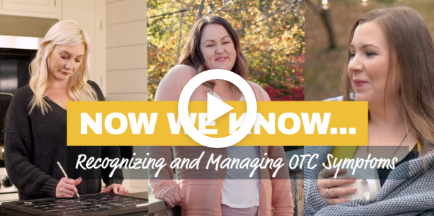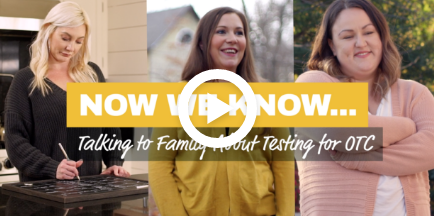If you’re an OTC carrier or think you might be, this page is for YOU. It was created based on the stories of carriers at different stages of life. Many OTC carriers experience symptoms like migraines, exhaustion, mood swings, heat intolerance, or feeling sick after eating protein. What they don’t know is that those symptoms may be caused by OTC.
“Everything just clicked as to why I’d been having these symptoms since I was a child, and no one could ever find answers for them. I felt relief to know OTC was the answer.”
– Aubrey
If you’re an OTC carrier, it’s time to know if symptoms you experience are really OTC-related. Use this page to help you evaluate your symptoms, hear from other OTC carriers who have been where you are, and learn what kinds of questions to ask your doctor. Now they know—do you?
Now We Know
The Importance of Community for OTC Women
Hear Aimee, Marie, and Frankie connect on living with OTC and share their experiences.
Read TranscriptMy journey to diagnosis was kind of a rough one. My whole childhood, I would get sick. We would, you know, go, out to eat and I would get sick shortly after. And my parents kind of always just attributed it to, you know, car sickness, or, you know, food not agreeing with me. But when I was 13 and, you know, things were starting to change, I had what they call a catastrophic event and I got really, really sick. My mom is an asymptomatic carrier. She doesn’t present with symptoms at this time. And she, you know, brought that up to them as kind of a last resort, you know. Like, I’m a carrier of this. Could this have something to do with it? And, you know, they were like, ‘You don’t know what you’re trying to diagnose, Ma'am’, you know. And, sure enough, they finally ran a blood ammonia test, and it was, you know, near 1,000. And I was in really bad shape but I’m really grateful, because you know, I think there's kind of a silver lining. My parents lost a son when I was 3 and that’s how my mom found out she was a carrier because it was before the newborn screening tests. And I just kinda think that, you know, had she not known that she was a carrier, that could have been a very different outcome for me.
So, my journey to diagnosis was actually through my last child. I live in Connecticut, so they do various tests on the newborn screening. And, sure enough, day 2 of his life, the NICU had come up and had told us that results had come back abnormal.
And they had thrown the OTC word at us. And they said we don’t really know if this is what he’s dealing with but it kind of seems like this might be it. They had finally said, ah, he does have the OTC, so it would be wise for you to get checked out ‘cause you’re possibly a carrier and you could become symptomatic. I did the test and sure enough, within like three or four weeks, I found out that I was an OTC carrier.
Mine, ah, was similar to, to yours [Marie] in the beginning. I found out through my second-born. My oldest son, he was born a normal, healthy baby. We didn’t suspect anything wrong initially. He was my second child so we went home, actually, the next day. I called, you know, the doctor. They also do the newborn screening. So, ah, the results of that had come back kind of wonky. Ah, they wanted to do additional testing. It was more testing and more testing, and then finally the results from the genetic testing came in and did confirm that he had OTC deficiency. So, then they said, okay, you know, usually, the mother can be a carrier. So, they wanted to have me tested. I was confirmed a few weeks later that I am a carrier.
Frankie, do you feel a sense of community when you meet other women with OTC?
Absolutely. Yeah, it’s like we all share a bond, ah, that really goes without explaining. Like we feel, I mean, we spend so much time explaining ourselves to everyone else in our lives. Whether it is our family or work or anyone that we run into. Like, they don’t know what this is. So, we’re always explaining ourselves.
So, when you meet other women, and this is for me and my experience, I feel like it goes without saying that we share the same thing that’s going on, and it’s nice not to have to explain myself. And then it’s also nice to feel like I’m not alone. You feel like no one quite understands what you’re going through when you’re not feeling well. It’s hard to find someone to relate to that. So, when you do, like, it’s like an instant connection and an instant family.
How about you, Marie?
Like you said, when you meet women who are dealing with the same stuff, you don’t need to spend time on the back story. You just get that sense of relativeness with other women. Ah, it’s a relief. It’s a relief to be able to share your stresses. And all the other stuff in between that comes with this disorder.
What about you, Aimee?
It is a very isolating diagnosis and disease. And, I used to not wanna talk about it ‘cause I thought I was alone, and no one would get it. But, you know, as I’ve, you know, grown, I’ve met more people and…it’s so exciting to know that like there’s this instant connection of like you, you get it. You just understand what each other’s going through. Even though your stories might be different and have different, you know, challenges or different components, you, you ultimately understand one another. And that’s been so amazing.
Listen to women living with OTC share their stories
Every OTC carrier story is different, but these women have learned one thing from their experience: knowledge is power. See how a little learning went a long way in helping them take control of their lives and enabling them to make informed choices about their health.
Additional Videos
Some people have the wrong idea when they hear the word carrier. Some think carriers aren’t sick or don’t have symptoms. And some think if they don’t have symptoms now, they won’t have them later either. Everyone is different. Listen to what Aubrey, Marie, and Frankie learned once they found out they were OTC carriers to help them manage their OTC and their life better.
You, Me and OTC
Having to constantly explain OTC to the people around you—even your doctors!—can be exhausting, so we created a resource to help. Below you’ll find two different worksheets. One is to share with people like family, friends, and co-workers, and one to share with people on your healthcare team, like your primary care physician or OB/GYN, who might not be as familiar with OTC.
Each worksheet gives a brief description of OTC and what it means to be a carrier; it also has space for you to fill in important information about the support and care you may need when it comes to making healthcare decisions that could be impacted by your OTC.
OTC Symptom Assessor Survey

If someone in your family has been diagnosed with OTC, use this OTC Symptom Survey to see if you've been experiencing any OTC-related symptoms. Be sure to share your results with your doctor. If you have been having symptoms, your doctor can talk to you about a management plan that's right for you.
OTC Family Tree

The OTC Family Tree can help you see who in your family may be at risk for OTC deficiency. Take a few minutes to fill it out, then review it with your doctor or genetic counselor to see who in your family should be tested for the OTC gene.
Separating Myths From Facts
MYTH: Carriers are not affected by OTC deficiency.
FACT: Many carriers experience OTC symptoms.
Some OTC carriers experience symptoms for some time before they even know they are carriers or that it is damaging their health.
MYTH: Carriers cannot have an episode of hyperammonemia.
FACT: Not true!
Even people with mild OTC can experience hyperammonemia (too much ammonia) at any age.
MYTH: What’s happening to you is normal and you just have to live with it.
FACT: You don’t have to live with things like nausea, migraines, or exhaustion.
There are things you can do to help keep these symptoms under control. An OTC management plan may help!
MYTH: It’s all in your head.
FACT: Elevated ammonia that’s not high enough to cause a crisis can still cause symptoms and damage to the brain.
Carriers may have less severe OTC, which means they may not experience hyperammonemic crises often or even ever. BUT, this doesn’t mean carriers don’t experience high levels of ammonia!
View video about the long-term effects of high ammonia in the body
MYTH: Genetic testing for UCDs is expensive and complicated.
FACT: The cost of a genetic test varies, and health insurance may cover some or all of the cost.
There are also programs available to help people afford a genetic test. The UCD Genetic Testing Program provides access to genetic testing for people suspected of having OTC and their family members at no cost.




